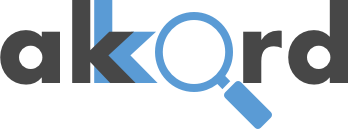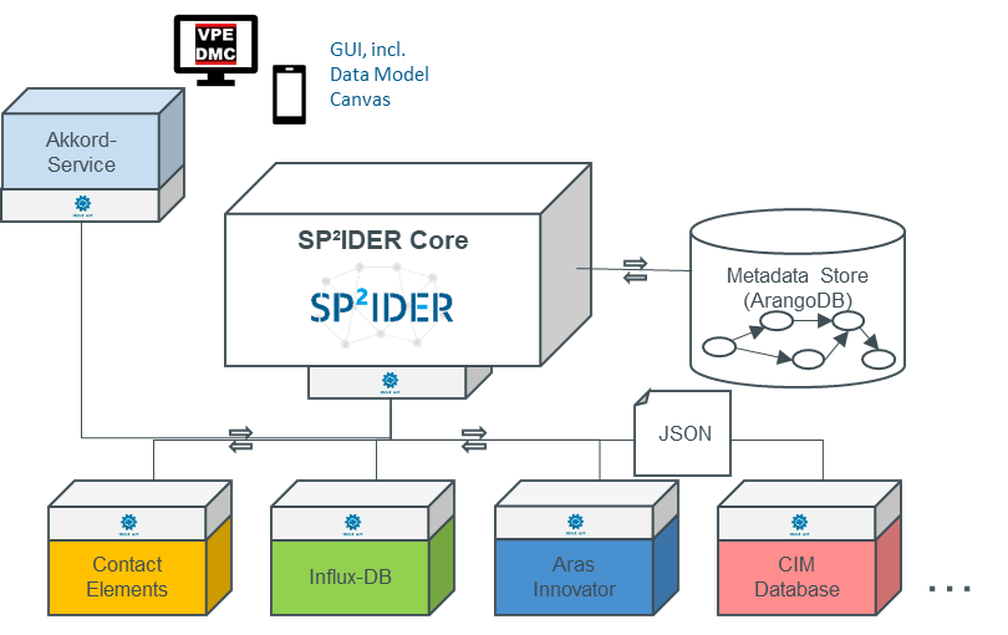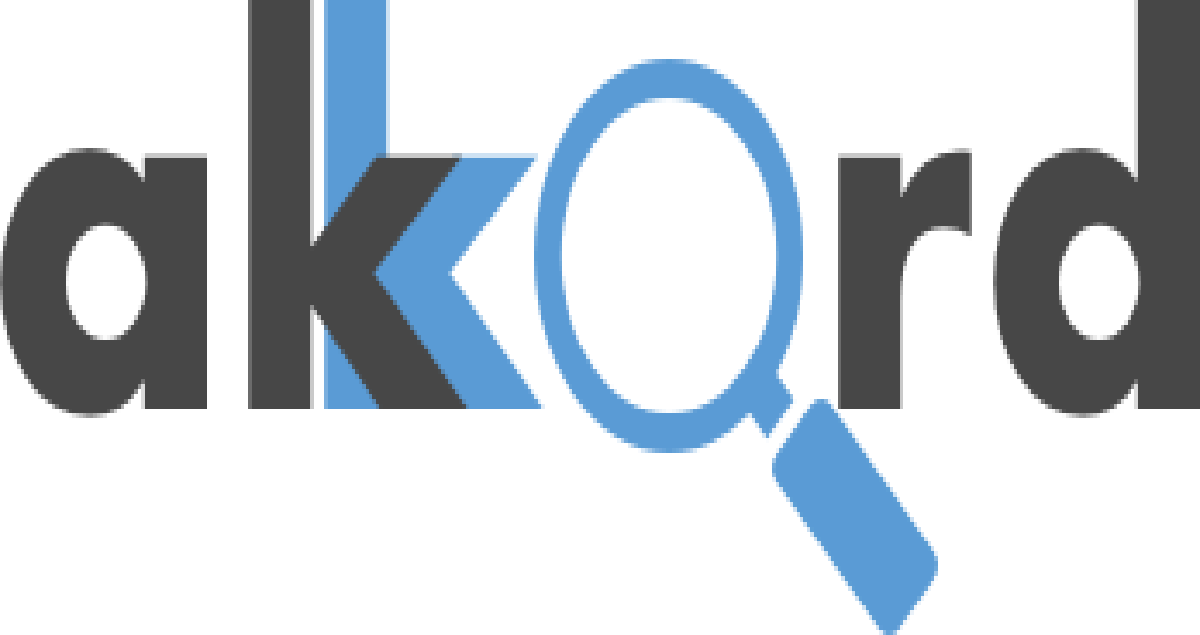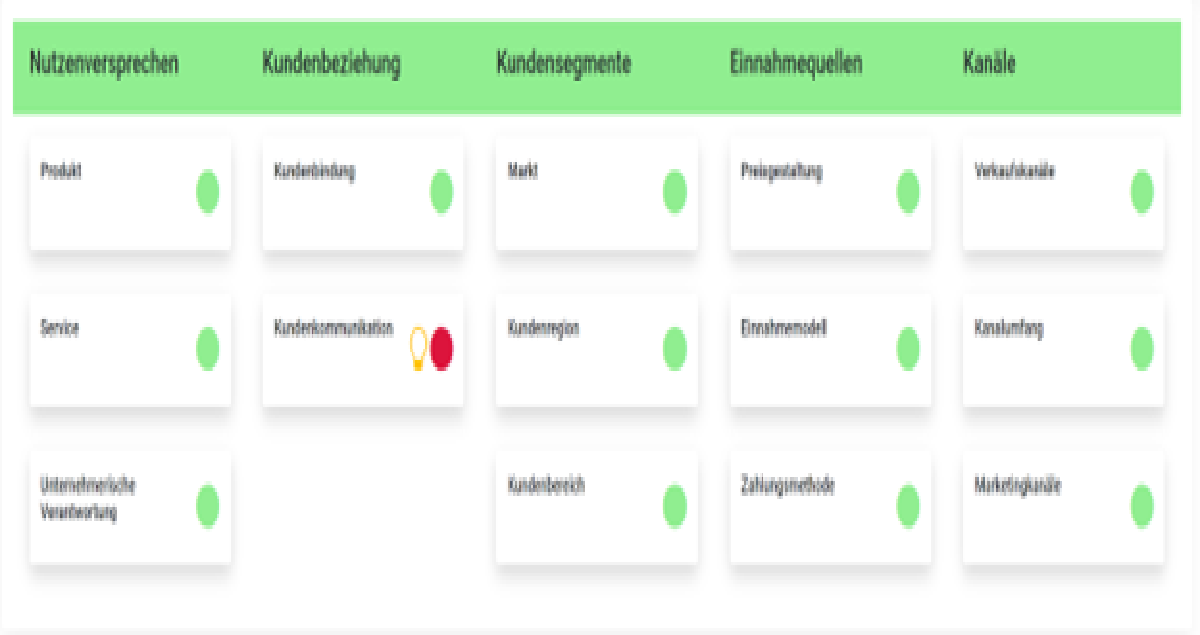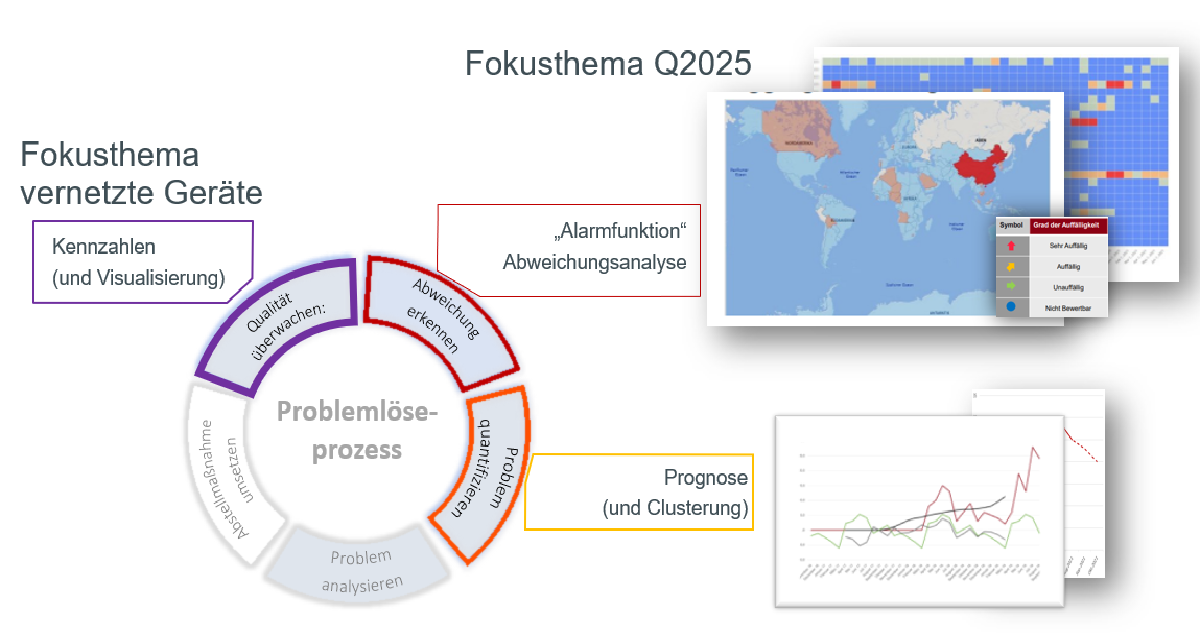Second Work report for the Use Case 5 “Directed and SME-friendly competence development” – by NEOCOSMO
In the context of Use Case 5, the focus is on competence development in the area of industrial data analysis, which in the first step included the development of measurable competence definitions as well as the development of corresponding measurement tools. On this basis, technology-based learning modules for industrial data analysis will be created, which will be incorporated into a digital knowledge service designed and developed as a part of the project. The creation of structures that offer the possibility of recording, promoting and securing competencies in value creation networks and the final transfer of these into practicable concepts and recommendations for action represent the central objective of Use Case 5.
Initial situation and progress within the Use Case 5
The knowledge and competence acquisition in the field of Data Science in SMEs represents the application scenario for AKKORD. The development of an online knowledge service in the style of a digital workplace on the basis of the NEOCOSMO platform PIIPE was carried out in 2020. In the first work report, the structure of the work&learn platform, the technical conception and development of course content as well as magazine articles and the collaboration possibilities as well as personalization options were discussed. In the following, the focus is on the further development of the platform that has been implemented since then.
Further development of the AKKORD work&learn platform
Self-assessment and recommendation function
In order to make it easier for new users to get started with the work&learn platform, a pop-up window appears after the initial registration (see figure 1), welcoming them to the platform and describing the possible first steps, which will be discussed in more detail below.
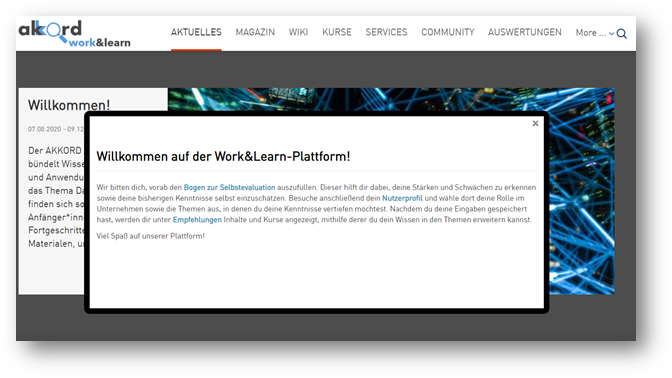
Figure 1: Welcome to the work&learn platform” pop-up
First, users are encouraged to fill out the self-assessment sheet designed by the BtF and linked in the pop-up. The self-assessment sheet is intended to help users assess their own knowledge in the various subject areas and identify their individual strengths and weaknesses. Based on the results of the self-assessment, users can then select the topics in which they would like to further deepen their knowledge and choose their role in the company in their user profile, which is also linked in the pop-up for a better orientation of the user. Users are also given the opportunity to select topics that are of particular interest to him or her.
First, users are encouraged to fill out the self-assessment sheet designed by the BtF and linked in the pop-up. The self-assessment sheet is intended to help users assess their own knowledge in the various subject areas and identify their individual strengths and weaknesses. Based on the results of the self-assessment, users can then select the topics in which they would like to further deepen their knowledge and choose their role in the company in their user profile, which is also linked in the pop-up for a better orientation of the user (see figure 2). Users are also given the opportunity to select topics that are of particular interest to him or her.
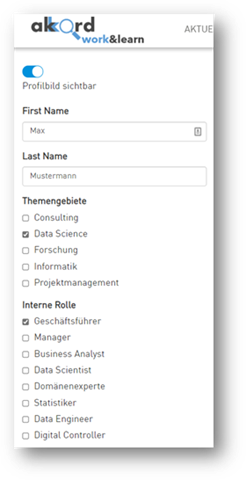
Figure 2: Selection of subject areas and role in the company in the user profile
The individual course contents and magazine articles are assigned to the corresponding roles or subject areas when they are entered into the platform, so that after the user has saved his individual details in the user profile, suitable content recommendations can be made for the respective user. These can be found under the heading “Recommendations” in the main navigation (see figure 3). Under this heading, the course created appropriately for the selected role (see here the example “Managing Director”) and the articles assigned to the respective subject areas in the magazine (see here the example “Data Science”) are recommended. This recommendation function enables the AKKORD work&learn platform to recommend the learning content and materials available on the platform in a way that is tailored to the user and thus to his or her interests and position in the company. The adaptation to the individual needs of the users is thus guaranteed.
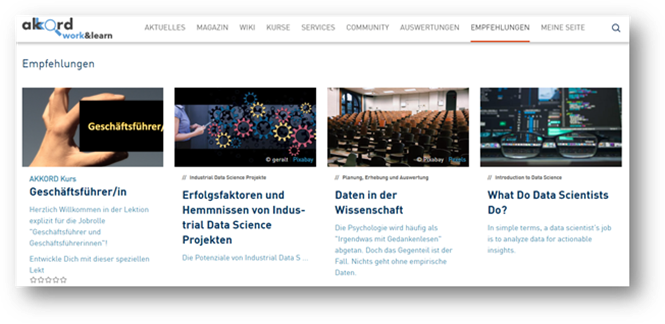
Figure 3: The “Recommendations” section in AKKORD work&learn
The procedure described in the pop-up is a recommendation, which, however, does not necessarily have to be followed. The user has the option at any time to adapt the information about his role in the company and his areas of interest or to use the AKKORD work&learn platform even without using the recommendation function.
Role-related courses, final tests and certificate generation
The courses captured on the platform are generally divided into external and internal courses. The latter is further subdivided into the Basic and Advanced course created by the BtF, as well as separate additional lessons. Beyond these, selected course contents of the Basic and Advanced course are bundled into courses for the roles in the company that can be selected in the user profile (see example in figure 4: course for the role of “Managing Director”).
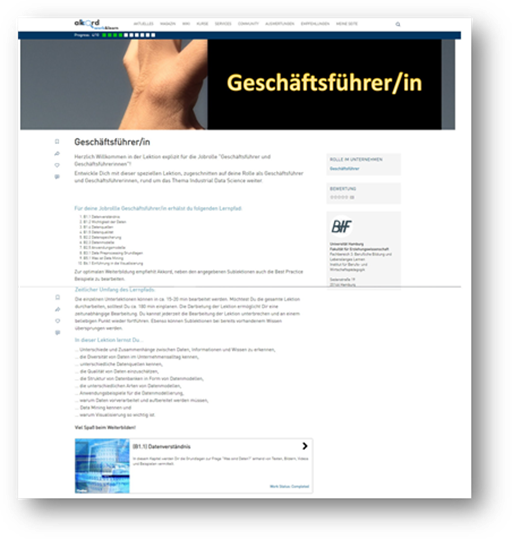
Figure 4: Excerpt from the role-related course “Managing Director”
After completing such a role-related course, users are given the option of completing a final test, which are created for each of these role-related courses (see figure 5). To guide the user in completing it, the number and the total number of questions in the final test is given for each question (e.g. question 3 out of 20 questions). In addition, after answering each question, the user receives appropriate feedback about the correctness of his answers, which is highlighted by a colored marker. Likewise, the user receives feedback on the points earned when answering a question, which creates everlasting transparency for the user.
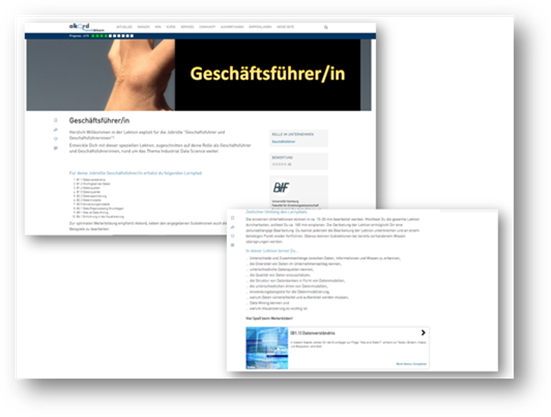
Figure 5: Excerpt from a final test
If a user has successfully completed such a final test, he can download a corresponding certificate in PDF format, which is made available to him in his user profile. This certificate is issued to the first name and surname specified by the user in the user profile and certifies the completion of the respective role-related AKKORD course, stating the course name and the date. With the certificate, the user is certified the successful participation in the respective role-related final test.
Evaluation of the results
The results of the individual users in the final tests are listed for analysis purposes in a section specially created for displaying the evaluations, to which the subsequent evaluator (BtF) has access. This listing is done by naming the course title (+ content ID), the completion date, the points achieved and the username (this name can be defined by the user). In addition, to simplify the analysis process, the evaluator is given the option to export the evaluations as an Excel or CSV file. Currently, the overall result can be viewed in the evaluations after a user has completed a final test (see figure 6). The display of the points achieved for the individual test questions is currently still in the development phase.
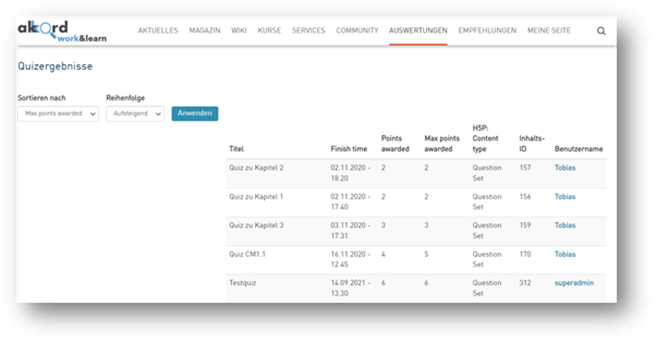
Figure 6: Excerpt from the evaluations of the final tests
Editorial supplements to the AKKORD work&learn platform
In the “Magazine” section in AKKORD work&learn, which offers users the opportunity to consult articles about relevant and current topics from the subject areas of Data Science, it was possible to integrate the work reports from the use cases and the service areas (see figure 7). In addition, further articles on individual topics were added, such as the white paper on the “An interview study on the human success factor in Data Science projects” (mosaiic GmbH) or the “Publication on the use of graphical representations of information and data in Industrial Data Science projects.” (IPS). The corresponding assignment to the subject areas was made so that the recommendation function can show users articles corresponding to their areas of interest (“Recommendations” section).
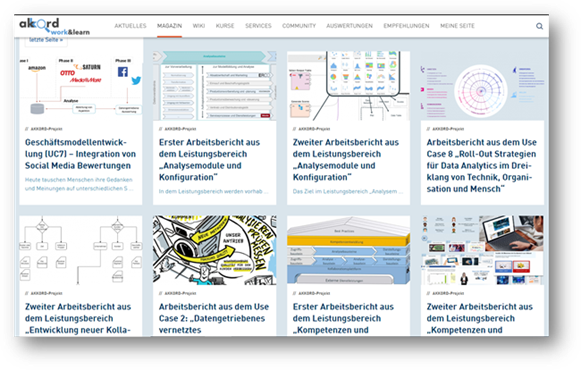
Figure 7: Work reports in the “Magazine” section
It was also possible to create the first entries in the Wiki knowledge database (Wiki), which will later serve as an entry point for users. This is because the wiki gives users the opportunity of a content-related participation by providing specialist input on specific topics – whether by expanding entries or by publishing their own entries on new terms. This contributes to the promotion of collaborative work and creates an ever-growing content network that is intended to serve as a reference work.
Outlook
With regard to the further development of the AKKORD work&learn platform, the expansion of two additional collaboration options is planned in addition to the comment function, the member directory and the social stream. While the comment function allows users to comment on all contributions to the platform or to ask questions, the member directory offers the opportunity to quickly and easily find contact persons on various topics. The social stream in the “Community” section allows users to write posts and thus provides a general way to address topics or answer questions. In the future, users will also be able to exchange information on a group or role basis, so that topic-specific questions can be discussed and answered in appropriate groups instead of posting them in the social stream that is seen of all users. In addition, a chatbot will be added to the work&learn platform, which will be available to users as their personal AI-supported assistant for Data Science.
Regarding editorial aspects, the distribution and content pages on the use cases and the AKKORD project partners are in preparation. First drafts have been created and published on the work&learn platform. These will be adapted and extended in the future, mainly based on the changes planned on the AKKORD website, and in the case of the partner pages, extended by a cover image for the content pages of the individual project partners.
